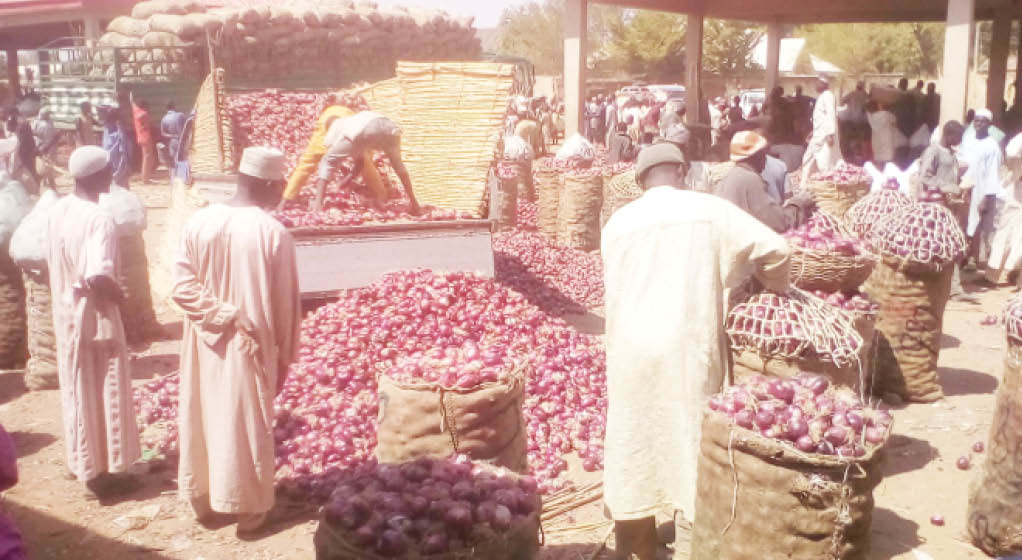Why onion farmers are forecasting low harvest
In the last two years, onion production and marketing have been severely affected by several issues, especially in Kano State. Farmers and dealers have expressed concern that meeting demands from various places within and outside Nigeria has remained a big challenge, driving prices beyond the reach of average consumers during the lean season. Although there […]

Onion market in Kano
In the last two years, onion production and marketing have been severely affected by several issues, especially in Kano State.
Farmers and dealers have expressed concern that meeting demands from various places within and outside Nigeria has remained a big challenge, driving prices beyond the reach of average consumers during the lean season.
Although there was a bumper onion harvest last year (2024), high demand led to high costs and scarcity of the pungent-tasting vegetables across the country.
However, despite various interventions to increase production, including the adoption of modern storage mechanisms to address the issue of post-harvest losses, as well as the introduction of hybrid seeds, farmers’ yield this year is expected to be low because of issues with the seeds that many of the farmers planted.
- $700m sugar investment will end Nigeria’s importation – Dangote
- In memory of General Murtala Muhammed: Restoring the virtues of good leadership in Nigeria
As the demand for Nigerian onions increased significantly within and outside the shores of the country, farmers started cultivating onions in large quantities, with many sourcing seeds from other unreliable vendors, which now places a lot of challenges for them, including poor production of bulbs.
Our correspondent, who went round and spoke with some farmers in the state, reported that the harvest may fall below expectations, which probably will strain availability this year.
Daily Trust gathered that though the harvest period is about to begin, farmers have been noticing that harvests are likely to be low, raising fear that recouping the huge amount spent on production will present a bigger challenge.
Adam Bello Kura, an onion farmer who said he has spent over N800,000 this year on his onion farm, is afraid as indicators have shown that he is not going to get what he is expecting from the farm.
The problem is attributed to low-quality seeds, which many of the farmers bought from the open market with a measure (mudu) selling for up to N150,000.
Some of the farmers who bought the low-quality seeds are already very concerned, as the results from their farms do not show prospects of good harvest.
The issue has generated serious concern for onion farmers across Kano State and some other parts of onion-producing areas across the nation.
One of the farmers, Bello Sharu, attributed the problem to the low-quality onion seed imported into the country and sold to unsuspecting farmers.
“We have seen what the newly introduced Takahe onion seed did; every farmer was impressed. And in our bid to sustain the tempo, we went and bought another version of imported seed thinking it would give us more yield than the Takahe. Now, we are lamenting. But onion farmers that have stuck to their traditional seeds are not affected,” he said.
However, when contacted on the issue, the state chapter chairman of the National Onion Producers, Processors and Marketers Association of Nigeria (NOPPMAN), Malam Labiru Alasan, confirmed that onion farmers are in trouble due to the imported seed sold to them.
According to him, farmers have the confidence that every imported seed must have gone through all relevant authorities for necessary checks before being given the go-ahead to be sold to them.
He explained that due to the recent high demand for onions, unsuspecting farmers invested heavily in their farms, unfortunately using the imported seed, which is now threatening to force them out of business and also create unnecessary scarcity in the country due to its poor yield.
“You will shed tears for onion farmers because after all the hurdles have been crossed, all of a sudden you realise that the seed you used isn’t good and your yield is badly affected. We launched an investigation and found that the new seed was imported into the country,” he said.
The state chairman added that already, the association has written to relevant authorities concerning the development, adding that there is a need for the government to wade into the matter to assist farmers and take measures to avert scarcity.
Earlier, the introduction of the Takahe seed variety had boosted farmers’ yield, with many recording impressive harvests.
Testimonies by onion farmers who planted the Takahe seed showed that they recorded highly profitable results.
Malam Abba Ibrahim, an onion farmer who used the newly introduced Takahe seed, said the seed is the right one for onion-producing sites in Kano State and other producing areas in the North.
“To be honest, the introduction of this hybrid seed of Takahe onion into production under the Kano State Agro-Pastoral Development Project (KSADP) has helped onion farmers a great deal. It was introduced to us in 2023 and people were so sceptical about it, but few did try it.
“The outcome of the result from those that tried it in 2023 is what prompted many onion farmers to go for it in 2024. I don’t need to say more, because the result is everywhere to see,” he said.
The seed has been outlined by a Kano-based agronomist, Lawal Idris, as an average maturing variety that produces medium- to large-sized bulbs and has a very good tendency of being stored for a long time using various available storage methods.
He added that its yield is higher than the normal variety, akin to onion production in the state.
